AVF recently caught up with Andreas Reimann, the senior patent and licensing manager of our AVF member Fraunhofer IME, to hear about the latest vertical farming news from the Institute’s New Agricultural Systems department.
Who is Fraunhofer IME?
The Fraunhofer Institute for Molecular Biology and Applied Ecology IME in Aachen, Germany is a pioneer in the field of plant-based research and part of the Fraunhofer-Gesellschaft, the world’s leading organization for applied research prioritizing the development of key future-relevant technologies with high social relevance. The organization is a not for profit, so does not sell any products but undertakes the research & development prior to partnering with businesses and organizations who want to use products or technology by license etc.
How can you make vertical farming commercially viable and secure food production?
The New Agricultural Systems (NAS) department at Fraunhofer IME conducts research in the areas of vertical farming, plant-based meat and single cell protein. The department originally focussed on their VertiPharm, a fully automated vertical farming unit with 8 layers, and 550 m2 of net cultivation area for various plant species and cultivation processes to produce recombinant biopharmaceuticals by Agrobacterium-mediated transformation using vacuum infiltration. The farm worked well but was complex with an expensive cost structure geared towards biopharmaceutical production that was difficult to transfer to the cost-sensitive production of food crops.
As of 2016 Fraunhofer IME began to look at the pros and cons of existing vertical farming technologies, how to improve them and what types of commercially viable food crops could be grown in them.
They looked at three areas:
- An improved alternative to the classical high rack system
- Utilizing sunlight directly or as part of a hybrid lighting system
- Cultivating larger, protein rich crops – Case Study for the German Veganz Group AG
This blog post focuses on the developments that Fraunhofer IME has made in developing an alternative to the high rack system. A separate blog post will cover the exciting developments in the utilization of sunlight in growing in vertical farms and in cultivating larger, protein rich crops.
OrbiLoop®/OrbiPlant® a novel and innovative approach to vertical farming
Fraunhofer IME sought an alternative to the traditional high rack systems of vertical farming. These racked systems posed several ongoing concerns:
- Most cannot use sunlight
- The CAPEX is high
- The systems are inflexible – you cannot easily change architecture or layers
- Racks make climate control a challenge and therefore more costly – heating and moisture in each of the layers need to be taken care of
- Plant logistics, i.e. placing, tracking and retrieving plants for harvest, is challenging and costly in traditional vertical farming systems.
What IME has developed instead is a novel and innovative approach to vertical farming – meet OrbiLoop®/OrbiPlant®
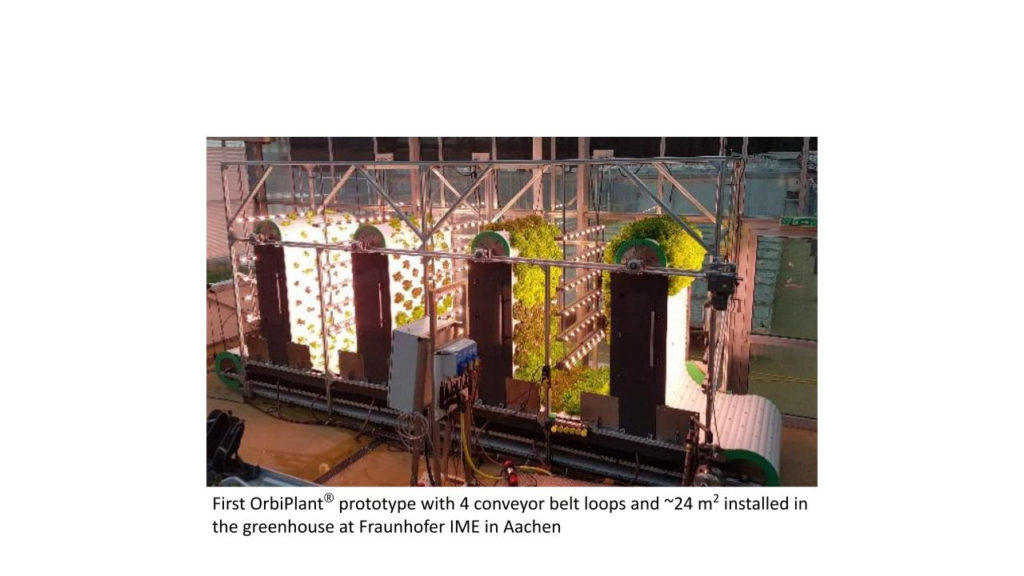
Image Courtesy of IME Fraunhofer
OrbiLoop®/OrbiPlant®
Fraunhofer IME has developed a vertical farming platform technology that uses an innovative rotating conveyor belt system where plants grow aeroponically directly in the conveyor belt as it moves featuring:
- Cost efficiency and a highly flexible business design
- High biomass yields with favourable morphology
- Easy automation, process control and logistics
- Easy climate control
- Possibility of full sunlight use
The impact of rotation or turning wheel effects on plant growth
This was a key breakthrough when researchers at Fraunhofer IME noticed that plants were responding in a particular way to the changing orientation towards the Earth’s gravitational field while the conveyor belt of the vertical growing system was rotating. The effect was for plants to grow more densely and produce more biomass in a smaller cultivation volume while the quality of the plants remained consistently high – meaning a better ROI.
The Rotational System is lightweight and flexible – so it is easy to insert plants into the system, access them at all stages of the growing cycle and harvest them. The plant will come to you, no specific process logistic or robotic system needed. Conveyor belt sections can be flexibly connected to form loops – from a single loop to numerous loops, for instance 5-30 loops. So you can set the growing system up efficiently and have as many loops as you need for cultivation days and even spare out some lighting modules as there are defined night phase sections in the system where no lighting modules are needed.
Nutrients are delivered aeroponically – so there is only a minimal water weight to handle which allows lightweight units that can easily be moved, constructed, and deconstructed as required.
This lightweight and flexible system means you can upgrade within existing infrastructure – and do not need to wholly repurpose or create a new build for the system which reduces original outlay costs.
No need to use a substrate matrix – Another positive of OrbiLoop®/OrbiPlant® is that no substrate matrix is required, you can sow the seeds directly onto the conveyor belt. This reduces cost and means that the root biomass can also easily be harvested as a second crop, and its value included in the business model. You can still use plant plugs with the system if you need or prefer.
Heat and Moisture Evacuation improved – The physics of the open vertical loop structure means the heat and moisture go up, like a ‘chimney effect’ – this makes it easier to evacuate and control as it is not trapped in layers like in stacking systems and makes it ultimately more cost-effective.
Utilizes Sunlight – the system can fully use sunlight, so you can use this in a greenhouse, on a rooftop or integrated into the building facade. Within the research project Mittendrin – Energy-optimized vertical farming as an integral part of urban architecture funded by the German Federal Ministry of Food and Agriculture (BMEL) on the basis of a resolution of the German Bundestag. Fraunhofer IME is currently looking with its project partners at ways to utilize sunlight as much as possible in a façade-integrated vertical farming approach to reduce the energy demands associated with lighting and heat. This includes using passive cooling approaches based on materials to absorb heat and then release that heat back into the system at cooler times. In cooperation with Fraunhofer IOSB they are also about to trial a brand new way of using direct sunlight optics as a stand-alone or hybrid way of lighting in an enclosed CEA environment (which we will cover in a separate blog post).
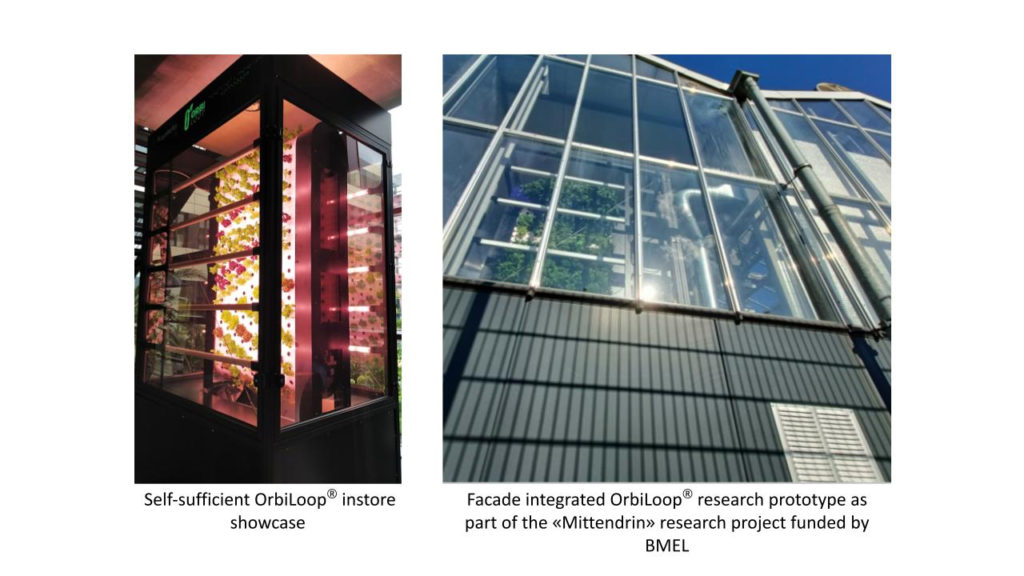
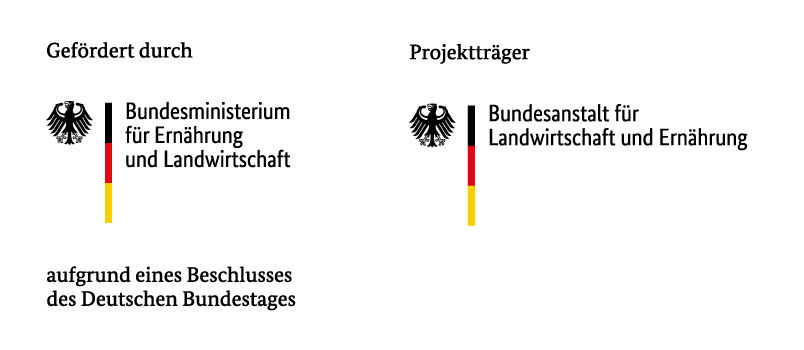
Image credits IME Fraunhofer
Proof of concept & Scaling up
The conveyor belt single-loop system OrbiLoop® was originally designed as a small-scale showcase for stores, canteens, and supermarkets where the self-sufficiency of the system was a huge benefit – the requirements were simple: electricity and water and if placed near a window it will significantly reduce electricity costs by using sunlight. The idea was to integrate these systems into buildings in the city.
To also provide a basis for the large-scale production the OrbiPlant® system was designed as a multi-loop platform. After two successful OrbiPlant® prototype systems with 4 and 7 loops and up to 45 m2 of net cultivation area Fraunhofer IME is currently planning a larger pilot-scale operation in their production hall in Aachen together with Veganz to generate the data it needs to more fully understand how the system can work most efficiently at a large scale.
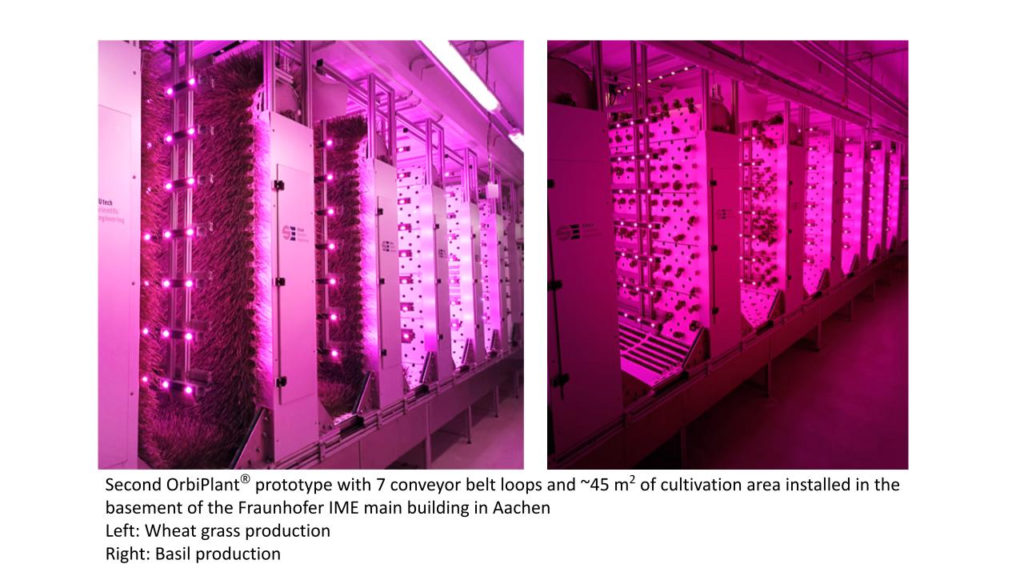
Image Courtesy of IME Fraunhofer
Fraunhofer IME entered an exciting partnership with Veganz two years ago to establish the production of pea plants in the OrbiPlant® system for pea protein. In a next step, Veganz acquired worldwide licensing rights for the platform technology paving the way for the Veganz OrbiFarm® system development and the production of protein plants on an industrial scale.
If you would like to know more about OrbiLoop®/OrbiPlant® and possibilities for project cooperation then contact the NAS vertical farming group leader Dr. Marc Stift at Fraunhofer IME, and you can come and meet the team at VertiFarm 08-10 October 2024, Messe Dortmund, Germany.
If you are interested in licensing the OrbiLoop®/OrbiPlant® platform technology or in buying OrbiLoop®/OrbiPlant® systems, please contact Andreas Reimann.

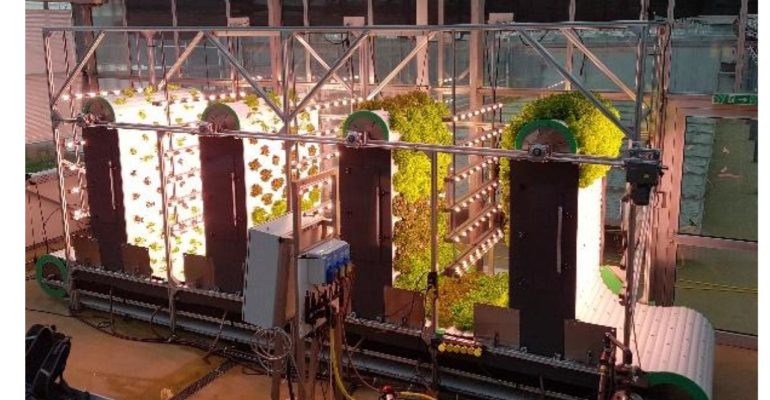
Comments are closed.